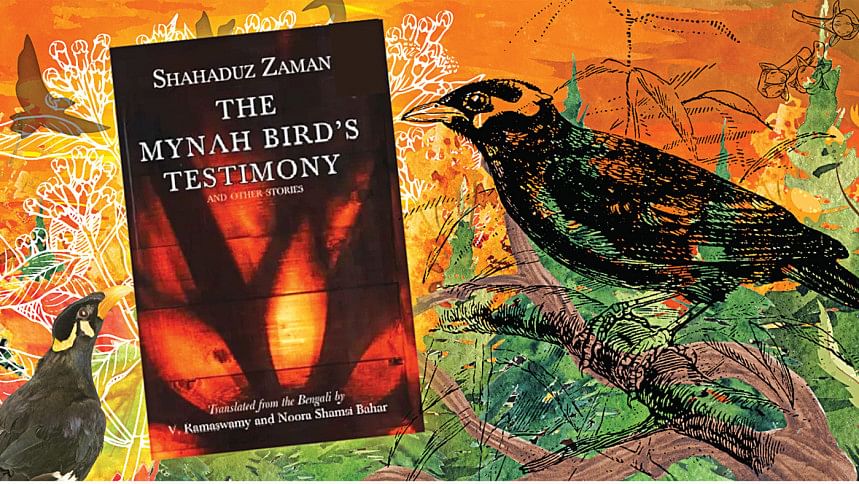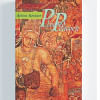The enchanting realism in Shahaduz Zaman’s ‘The Mynah Bird’s Testimony’

Shahaduz Zaman is a familiar face in Bangladeshi literature, whose literary career spans decades of fruitful work. He regularly writes columns for Bangla newspapers, has written a few notable biographical fiction, such as Ekjon Komolalebu (Prothoma, 2017), based around the life of Jibanananda Das, and has garnered some duly needed appreciation for ethnographic work on the history of medicine during the liberation war. The Mynah Bird's Testimony is not his first short-story collection to be translated into English, either. Sonia Amin had earlier translated Shahaduz Zaman's Ibrahim Buksh's Circus and Other Stories (UPL, 2008).
The present collection of stories is a product of the Kolkata-based venture The Antonym (an independent publisher and online literary translation magazine). It sees veteran translator V Ramaswamy and Noora Shamsi Bahar, writer and academic at North South University, bring Shahaduz Zaman's eclectic stories to a global audience. The stories speak for themselves: peculiarly introspective and understated, Shahaduz Zaman's writing often provides an intimate portrait of his characters' visceral lives.
Consequently, two of the strongest stories here are "Discard the Love of Clove" and "My Position Regarding Death is Absolutely Clear". The latter is a heartfelt story where Shahaduz Zaman's witty language and refrains ("burnt aubergine-like skin") coalesce into a memorable tale of loss.
Take the story "An Envelope in the Semblance of a Piece of Sunlight," for instance. We find Andaleeb in possession of discarded letters, one of which is sent by a "convicted felon sentenced to death by hanging," (as it is ridiculously stated right on the envelope). The contents of this letter pulls Andaleeb to a different world and he finds himself intervening in the lives of strangers. Where in the original Bangla, the felon appears vulnerable in the letter, in Bahar's English, he is a different character, almost irritated that his brother has seemingly abandoned him.
Bahar is better able to encapsulate the environment in, "Then, As I Kept Going," for which she had won the Tagore Award for Translated Fiction in 2021. It is a splendid story, a colorful mix of local and global. "Internet and pizza hadn't reached the village yet," the story announces, "A DVD player ran on battery power at the tea stall where I sat, sipping on my tea. Some actress was dancing to the song 'Tanki Futa' on the TV screen." It has a crisp, vivid image that stays with the reader.
Consequently, two of the strongest stories here are "Discard the Love of Clove" and "My Position Regarding Death is Absolutely Clear". The latter is a heartfelt story where Shahaduz Zaman's witty language and refrains ("burnt aubergine-like skin") coalesce into a memorable tale of loss. We see the son ruminating over his dying father, a man who once "had his pockets picked twice the same day." The ordeal is shown through a bleak series of repetitions, the best of which dwell on conversations with doctors that orbit unendingly on the time one's loved ones have left.
In "Discard the Love of Clove," one can find all the elements of storytelling that Shahaduz Zaman is known for. Unpredictable turns, throttling societal norms, and an awareness that borders on meta-fiction. The author's shortcomings in writing women (relying usually on tired comparisons with the moon or celebrating them for being model housewives) are absent in his protagonist Nargis Parveen. A captivating character, she is known as "Chhokka Beti" for she screams out "Chhhokka-a-aa" after rolling a six in Ludo. When she is married off to the recently widowed Mojammel Ali (puzzlingly the translation has the characters saying "I do" in their wedding instead of the more common "qabool"), Nargis upends all societal expectations from her. The story is an immensely enjoyable read and while its central beauty is a witty line that Nargis shares with Mojammel Ali's son-in-law, it is sadly untranslatable into English. In the original Bangla, it is a unique verse, full of wordplay and flair, which in Ramaswamy's English is an unconvincing summary of the line.
The title story speaks to Shahaduz Zaman's talents in fiction. A rags to riches story is given a near-magical depth. We find Bajlu, a mere tree climber, immersing himself into the world of punthis. The fairy tales in verse inspire him to concoct heroics and change his life for the better. It is one of many bright pockets in this new collection.
One definitely sees The Mynah Bird's Testimony, both the story and the collection entirely, to have a lasting presence. Zaman's devoted readers would not be disappointed.
Shahriar Shaams has written for Dhaka Tribune, The Business Standard, and The Daily Star. He can be emailed at [email protected]. Find him on X: @shahriarshaams.

 For all latest news, follow The Daily Star's Google News channel.
For all latest news, follow The Daily Star's Google News channel. 







Comments